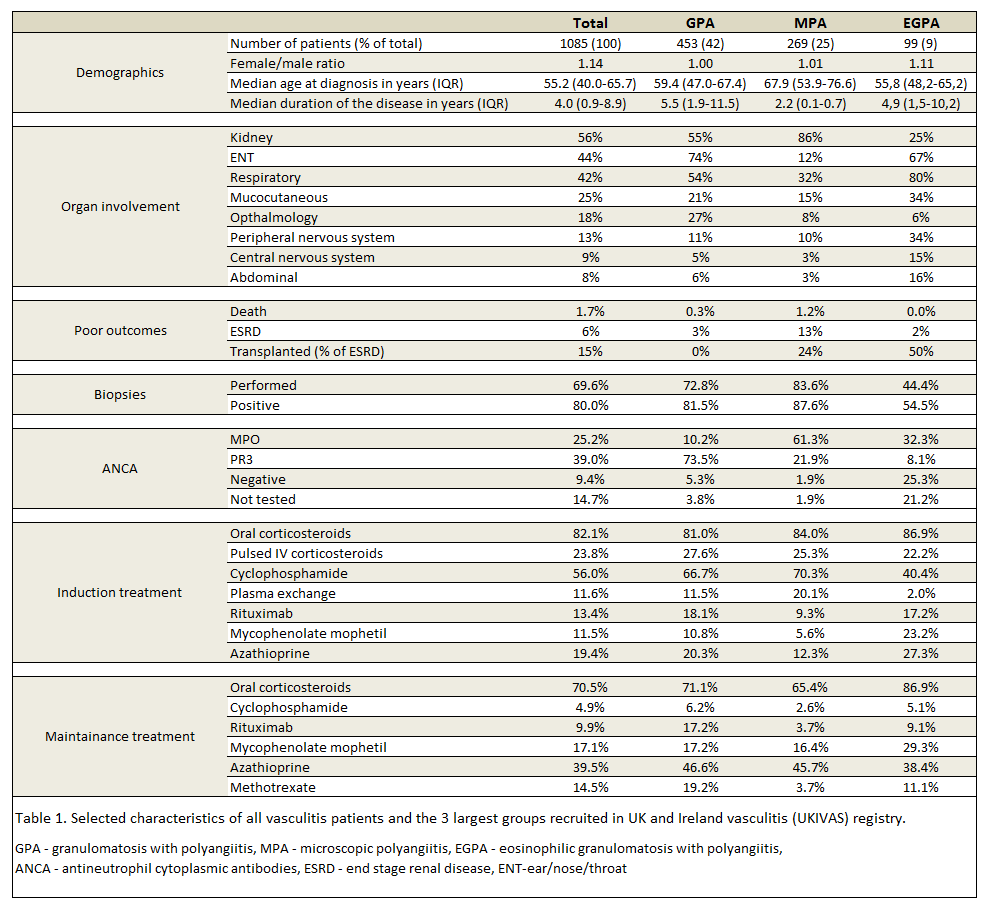Background/Purpose
Clinical care and research into systemic vasculitis is hampered by its rarity and its presentation to a wide array of medical specialties. We aimed to establish a UK and Ireland registry of patients with different forms of vasculitis (UKIVAS) in order to amalgamate our clinical experience and provide comparative outcome data on a large cohort of patients from multiple centres. This will inform research (trials, immunogenetics, epidemiology), service planning and commissioning (particularly of expensive biologic agents).
Methods
We are recruiting patients with systemic vasculitis under regular care of a variety of specialists across the UK and Ireland. We developed web-based software to enable prospective collection and central storage of anonymised clinical data with local storage of patient identifiable information. The application was designed for use by each centre as the local clinical database and audit tool.
Results
To date, we have recruited 1085 patients from 18 centres. The median age at diagnosis was 55.8 years (IQR 40.9-66.0) with similar gender distribution; almost 90% were white Caucasians; 87% were prevalent cases at the time of recruitment. The majority had one of the anti-neutrophil cytoplasm antibody (ANCA) associated vasculitides: granulomatosis with polyangiitis (GPA) (42%), microscopic polyangiitis (MPA) (25%), or eosinophilic granulomatosis with polyangiitis (EGPA) (9%); the remainder were defined as giant cell arteritis (GCA) (5.6%), unclassified ANCA associated vasculitis (3.8%), anti-glomerular basement membrane disease (2.3%), Behcet’s (2.3%), IgA vasculitis (2.3%), Takayasu’s (1.2%), polyarteritis nodosa (1%) and other types of vasculitis (<1% each). Biopsies were performed in 755 (69.6%) patients; results were positive in 466/555 (84%) GPA and MPA (Vs. 54% EGPA and 52% GCA). The majority (82.1%) received oral corticosteroids and cyclophosphamide (56% overall, 68% in GPA/MPA) for induction. The most common maintenance treatment with corticosteroids was azathioprine (39.5%). The detailed characteristics of the whole cohort and the 3 largest groups are shown in Table 1.
Conclusion
We have established a web-based registry for systemic vasculitis which can be used for gathering data at a national level and potentially linked with other international databases. The clinical features and treatment regimens reflect the predominance of ANCA vasculitis with renal involvement, with relative under-representation of other types of vasculitis. The introduction of new non-renal centres, the opportunity to biobank samples and longitudinal observation of this cohort will support further development of this project and research in vasculitis. The UKIVAS registry will be a useful way of identifying patients who may wish to take part in future clinical trials.
Disclosure:
J. Sznajd,
None;
A. D. Salama,
None;
D. Jayne,
Roche/Genentech,
2,
Roche/Genentech,
2;
A. Chaudhry,
None;
M. Robson,
None;
J. Rosa,
None;
N. Basu,
None;
S. Moran,
None;
M. Venning,
None;
P. Lanyon,
Eli Lilly and Company,
6;
A. Sharma,
None;
M. A. Little,
None;
R. Watts,
None;
R. Luqmani,
GSK, Nordic, Chemocentryx, Roche, Nippon Kayaku,
5.
« Back to 2014 ACR/ARHP Annual Meeting
ACR Meeting Abstracts - https://acrabstracts.org/abstract/united-kingdom-ireland-vasculitis-registry-cross-sectional-data-on-the-first-1085-patients/

